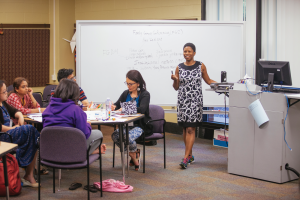
In the fall of 2016, EMU’s Center for Justice and Peacebuilding (CJP) debuted an expanded course catalog featuring its new MA in Restorative Justice program. In keeping with CJP’s long-established leadership in the field of restorative justice, the degree is the first of its kind offered by a traditional, residential graduate program at any North American university.
The core restorative justice courses, designed to give students broad exposure to the theory, history and application of restorative justice, will be taught by CJP professors Carl Stauffer and Johonna Turner. More specialized restorative justice courses taught by visiting faculty will also be offered during the annual Summer Peacebuilding Institute.
Degree requirements will also include some of the peacebuilding courses that form the core of CJP’s MA in Conflict Transformation degree; electives on topics such as trauma, community development, international development or organizational development; and a research project related to restorative justice.
Among the new degree’s distinctive aspects is that it teaches restorative justice in a graduate program with broad emphasis on peacebuilding and conflict transformation.
“Restorative justice is often taught with a rather narrow focus on applications such as criminal justice or education,” writes, a CJP professor and co-director of CJP’s Zehr Institute for Restorative Justice. “A restorative justice program rooted in the frameworks of conflict transformation, trauma awareness and peacebuilding provides for a much deeper and broader foundation, with a wide range of applications. This has often been remarked on not only by our graduates, but by people who have worked with them.”
Another notable emphasis of the program will be its application of restorative justice theory and practices to social movements and structural change.
“We are building the curriculum around the idea that restorative justice not only affects the individual, but that it also has the frameworks and tools and values to be applied to systems and structural change,” said Stauffer. “That’s new territory [in the field].”
Turner adds that the restorative justice movement overlaps with “a broad range of social movements for social justice” and offers effective tools for addressing structural violence.
“Young people of color organizing for restorative justice in their schools see this movement as critical for dismantling the school-to-prison pipeline and ending state violence against youth,” she wrote in an email.
Students in the new degree program can pick from four areas of focus for their study of restorative justice, including criminal justice, community-building, transitional justice and education. (The education focus will include partnership with EMU’s MA in Education program, which currently offers a restorative justice in education concentration and graduate certificate, and is starting an MA in Restorative Justice in Education program in fall 2017).
One of the justifications for the new restorative justice program, highlighted in a prospectus prepared by CJP, is the fact that rapid growth in the practical application of restorative justice has resulted in a “significant disconnect between practice and theory.”
“As a result, there are many lost opportunities for collaboration, improved practices, program reforms and mutual learning,” the document continues. “This program would help to bridge the divide between practitioners and theorists, and give opportunities for current practitioners to explore the theoretical debates and current research in the field.”
“We think this degree broadens and deepens the EMU commitment to peacebuilding,” writes CJP Academic Programs Director Jayne Docherty. “The maturing of the field of restorative justice is evidenced by the number of school systems and criminal justice systems that are adopting restorative justice practices. At CJP we think that restorative approaches to justice have even more to offer when those practices are linked to an orientation toward social, political and economic change that focuses on long-term transformation of the systems that promote and perpetuate inequalities.”